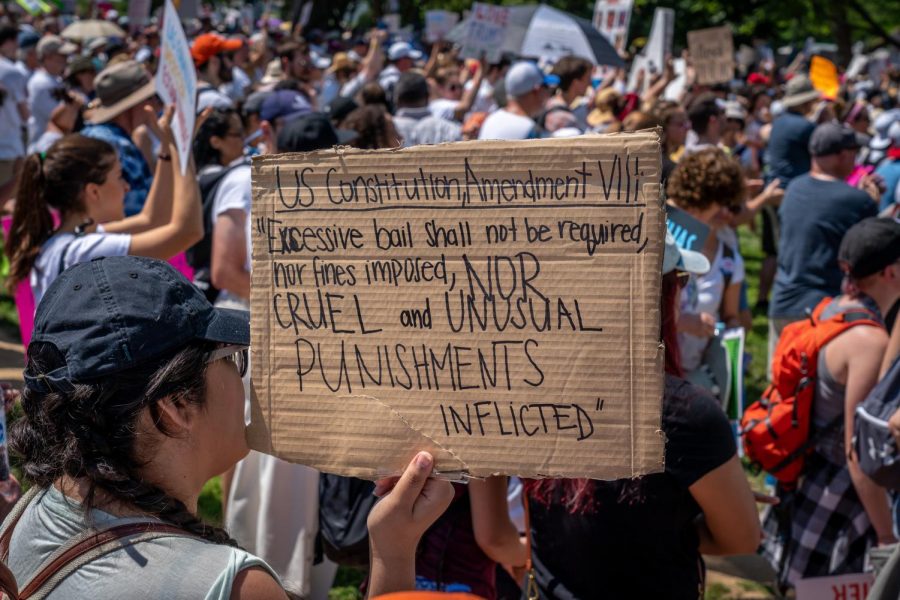Head to Head: Should Utah Keep the Death Penalty?
November 18, 2019
Utah is one of thirty states in the U.S. that still uses the death penalty. Two of our writers, Morgan Barron and Kennedie Starr, debate whether this form of punishment should still be allowed.

Ted Bundy in court. Bundy confessed to 30 murders prior to his execution. (Courtesy Wikimedia Commons)
Barron: The Death Penalty Benefits Victims and Protects Communities
Six people currently sit on Utah’s death row. One was convicted of torturing, raping and murdering a student. Their home is currently a 14×7 foot cell with a toilet, sink, mirror, hard bunk and futon. They are permitted to leave the cell for only three hours each day. Still, the punishments of death versus remaining alive — even under the most miserable conditions — are not the same, and “consequently there is no [justice].” Indeed, the implementation of the death penalty in our society is necessary, as it provides justice to victims and protects communities from further harm.
On Jan. 6, 2004, Rebecca Petty sat in an Arkansas prison awaiting the execution of her daughter’s killer, Karl D. Roberts. Roberts had been convicted in the spring of 2000 of killing 12-year-old Andi Brewer. Roberts insisted for years that he would not appeal his sentence, but as he was strapped into the gurney and prepared to receive a lethal injection, he changed his mind and was granted a stay of execution. His victim never got a second chance. Though Andi likely begged Roberts for her life, he still raped and strangled her. Victims’ families who push for the execution of their loved one’s murder are often accused of “being out for revenge,” but they are only advocating for justice — for their loved one’s life to be valued equally to the life of their killer.
Belinda Crites supports the death penalty after what Eric Randall Nance did to her cousin and family. Nance was convicted of raping and killing Julie Heath based on DNA evidence found on her inside-out underwear. After struggling with the murder of her daughter for 15 months, Nancy Heath committed suicide on Christmas morning. Sadly, Nancy’s anguish is not unique. A 2007 study suggests that for every homicide victim, six to 10 of their close friends and family are “indirectly victimized” by their murder. Other studies suggest an increased mortality rate for those who have lost a family member. While nothing can provide closure to those who have lost loved ones to intentional violence, Crites says that she felt relief when Nance was executed.
Ted Bundy was a University of Utah law student when he was arrested and convicted of aggravated kidnapping in Utah. Also a suspect in open murder cases in Washington and Colorado, Bundy was extradited to Aspen to stand trial. Bundy initially escaped from the Colorado jail in the Spring of 1997, but he was found seven days later still in Aspen. He must have learned from the errors of his earlier escape because when Bundy escaped again he wasn’t recaptured until he was found 47 days later in Pensacola, Florida. During his 47 days of freedom, Bundy assaulted six women, and only three of them survived his attacks. Famously, a Florida sheriff told Bundy, “Washington missed you, Utah gave you away, Colorado lost you, but I’m going to fry you.” While this comment may appear to be the posturing of an aggressive cop, I believe it stemmed from a desire to make sure this sadistic killer, who had already proven to be a risk, could never harm another community again. Bundy confessed to 30 murders, including six in Utah, prior to his execution.
Casey Pigge has been serving a life without parole sentence in Ohio since 2009 for killing his ex-girlfriend’s mother and setting her home on fire. Being in jail has not prevented Pigge from killing, as he beat his cellmate to death and strangled another inmate. After Pigge viciously attempted to beat a guard to death with another inmate, County Prosecutor David Fornshell said, “If [Pigge and his accomplice are] not executed, they will kill other inmates or corrections officers … They’re known killers.”
A similar situation occurred in Utah when Troy Kell, a convicted murderer from Nevada, came to the Central Utah Correctional Facility (CUCF) as part of interstate prisoner trade. While housed at CUCF, Kell earned himself a spot on Utah’s death row for stabbing Lonnie Blackmon, who was serving a sentence for robbery, 67 times while yelling “white power.” While the homicide rate in prisons is relatively low, four to six inmates are killed per 100,000 state prisoners. Housing killers who have a flagrant disregard for human life for their lifetime is dangerous to the general prison population.
A concern many raise when questioning the role of the death penalty in the American justice system is the risk of killing innocent people. However, researchers have concluded the rate of innocent defendants serving life in prison is much higher than those on death row. The legal resources poured into capital punishment cases often lead to the exoneration of innocent parties, making justice more accessible to those who have been wrongly convicted.
Justice requires that the gravest crimes receive the most severe punishment allowed, and in the United States, that is currently the death penalty. To satisfy justice and protect our communities, our state and country should continue to smartly engage the death penalty when faced with convicted murders who have perpetrated intentional and unnecessary violence against others.

A protestor carries a sign quoting the 8th Amendment. (Courtesy Flickr)
Starr: Utah’s Death Penalty Is Too Barbaric To Bring Justice
The six people currently on death row in Utah join a total of 2,673 people who face execution in other states and in the U.S. military. While the decline in the death row population continues annually, execution is still a form of punishment in many states. Despite it being unconstitutional, a disservice to victims and their families and extremely costly and barbaric, the United States continues to use capital punishment even though better sentencing options exist.
It can be a decades-long process for capital cases to work their way through the system, which does not serve victims nor their families. It is actively cruel to make those who have already suffered enough deal with an unresolved judgment and multiple appeals. The concept of justice needs to be centered around victims, and lingering cases that trudge through an inefficient system are the exact opposite form of justice and resolution deserved by victims. The extensive and complex process re-traumatizes survivors and victims’ families while also distressing people sitting on juries and those who have to carry out the execution. The idea of closure being achieved through capital punishment is outrageous, and research has shown that life without parole may be a better form of victim-centered justice when considering the physical and psychological well-being of survivors.
The death penalty involves complex legal cases and prolonged timelines, which cost states much more than a sentence of life without parole. Longer trials and years of appeals create excessive sums which could have been avoided with another sentence. A 2012 study done in Utah showed that an extra $1.6 million is spent on death penalty cases than if the sentence had been life without parole. It does not make sense to spend more on a penalty method that does not serve victims well, when other, less traumatizing options exist.
Most states execute individuals through lethal injection, and 16 states apply a secondary method if the drugs aren’t available (shortages frequently occur). Drug companies are not pleased about their products being used for death sentences, and supply dilemmas have arisen out of this as companies have either stopped making certain drugs altogether or have put limits on the purchase of them. Because of this supply issue, secondary forms to execute people are used such as electrocution, hanging and gas. Utah’s secondary method is execution by firing squad, which was last used in 2010 for a 1984 murder case. All of these methods are horrific and it feels almost unbelievable that a firing squad put someone to death in the last ten years within a state so determined to be characterized as pro-life.
These primary and secondary methods of execution should be appalling to the public, and ultimately, sending people to their death is a form of punishment that is both cruel and unusual. These procedures are gruesome and inhumane, and the question around the constitutionality of sending people to their death should further motivate us to prohibit capital punishment altogether. The cruel use of firing squads and injecting drug mixtures to kill people is inconsistent with what makes societies civilized. Most countries around the world have recognized the irreversibility and brutality of capital punishment and have abolished it. As a whole, the United States maintains the unusual practice, but 20 states and Washington D.C. have outlawed capital punishment. They now instead sentence people to life-long prison sentences without the option of parole, and Utah should do the same.
Not only is capital punishment unconstitutional because of the protections granted from the 8th amendment regarding cruelty, but it’s also inconsistent with equal protection of the law specified in the 14th amendment. This violation is blatant considering which populations are more likely to be sentenced to death. This already prejudiced criminal justice system is more likely to arrest, convict and incarcerate people of color more than any other group. Capital punishment sentences unfairly direct brutality to these groups and once more deny people rights promised in the Constitution.
As of April 2019, black defendants make up 41% of the death row inmates in the United States, despite African Americans only being 13% of the total population. Race of the victim also directs sentencing, which makes the application of the death penalty unjust. Analysis has shown that if a victim was white, the death sentence was more likely to be brought forward. So while the homicide rate is significantly higher for black men and women, skin color is directing cruel and unusual punishment to provide “justice” for white people primarily. We should be disgraced with a practice so allied with discrimination.
The list of problems surrounding capital punishment makes its application in 2019 senseless. The Supreme Court has narrowed its usage, but many states still hold the option to send people to their death through sickening means as a way to provide “justice.” Who is served by a drawn-out, expensive and discriminatory practice? Abandoning this archaic system is the best way forward, and Utah should reconsider legislation to eliminate it.



